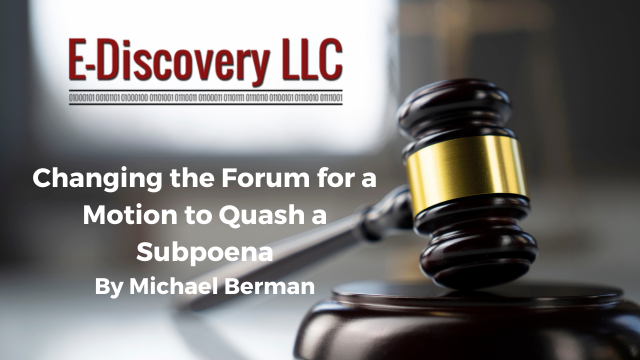
[EDRM Editor’s Note: The opinions and positions are those of Michael Berman.]
In Rullan v. Goden, 2024 WL 1191600 (D. Md. Mar. 20, 2024), the Hon. J. Mark Coulson construed a Fed.R.Civ.P. 45 motion to quash or modify a subpoena, which would have been heard in New York, as a Fed.R.Civ.P. 26(c) motion for protective order that was resolved in the District of Maryland.
Here, Defendants’ motion is based, at least in part, on Rule 26 given Defendants’ citation to the same in support of its motion to quash….. The undersigned will therefore construe Defendants’ motion as one for a protective order under Rule 26(c) and analyze it accordingly.”
Hon. J. Mark Coulson in Rullan v. Goden, 2024 WL 1191600 (D. Md. Mar. 20, 2024).
Rullan involved a dispute over what I will loosely describe as control of a business. Id. at *1. While the case was pending in the District of Maryland, some assertedly relevant documents were at the Davidoff Law Firm in New York. Id. The law firm was not a party in the lawsuit.
Plaintiff served a subpoena on the law firm, seeking six categories of documents. Id. at *4. Service was in New York, as was the location of the requested production. Id. at *5.
Defendants filed a motion to quash in the District of Maryland. In their response, defendants asserted “the attorney/client privilege with respect to all communications with the Davidoff Law Firm, and object to the production of any documents prepared by the Davidoff Law Firm which constitutes attorney work product.” Id. at *5. They also asserted harassment and that the requests were beyond the scope of discovery.
Plaintiff replied that the District of Maryland lacked jurisdiction to adjudicate the motion and made other arguments not relevant to this blog. In pertinent part, the Court wrote that: “Plaintiff argues that Defendants’ motion should be denied because the proper court to consider Defendants’ motion is the U.S. District for the Southern District of New York.”
Under Fed.R.Civ.P. 45, a motion to quash a subpoena must be filed in the district where compliance is required. In Rullan, that was New York.
However, the defendants argued that, “[f]rom a practical matter, it is simply not feasible for the Defendants to adjudicate discovery disputes in this matter in other jurisdictions.”
The Court, bound by the text of Rule 45, was “receptive” to that argument: “But it is not the Court’s (nor Plaintiff’s) doing that the Davidoff Law Firm maintains a place of business in New York and that Defendants’ current counsel is not admitted to practice before any applicable New York federal court.” Id. at *6.
The Court explained that: “The language of Rule 45(d)(3)(A) is clear that ‘the court for the district where compliance is required’ must quash or modify an improper subpoena. Courts in the Fourth Circuit routinely hold that motions to quash must be filed in accordance with this directive, even where Rule 45(a)(2) requires that a subpoena be issued by the court where an underlying action is pending.” Id.
In short, the Court had no option under Rule 45 and wrote: “Defendants’ motion is denied to the extent that it seeks to quash the Subpoena pursuant to Rule 45.”[1]
Faced with what might be a harsh result, the Court recognized, in my words, a “work around”:
However, both this Court and others within the Fourth Circuit have construed motions to quash under Rule 45 or discovery related motions generally as motions for a protective order under Rule 26(c) where the party discusses, or at least bases its motion in part on, Rule 26.
Hon. J. Mark Coulson in Rullan v. Goden, 2024 WL 1191600 (D. Md. Mar. 20, 2024) (citation and quotations omitted).
If applied, that principle had forum-related consequences:
Rule 26(c)(1) provides that “A party or any person from whom discovery is sought may move for a protective order in the court where the action is pending.” (emphasis added).
Hon. J. Mark Coulson in Rullan v. Goden, 2024 WL 1191600 (D. Md. Mar. 20, 2024).
Applying that principle, the Court wrote: “Here, Defendants’ motion is based, at least in part, on Rule 26 given Defendants’ citation to the same in support of its motion to quash….. The undersigned will therefore construe Defendants’ motion as one for a protective order under Rule 26(c) and analyze it accordingly.”
In sum, by treating the Rule 45 motion as a Rule 26(c) motion, the forum was changed from the Southern District of New York to the District of Maryland.
Construed as a motion for protective order, defendants’ motion was granted in part and denied in part. Id. at *1.Two interesting points in Rullan that go beyond the scope of this blog are:
- The Court’s discussion of defendants’ failure to properly particularize privilege objections; and,
- “It is worth noting that a denial of a discovery motion for failing to meet and confer pursuant to Local Rule 104.7 is generally without prejudice to the moving party to simply refile the motion in the event that further efforts to resolve the discovery issues are unsuccessful. There is thus likely no practical benefit to require further meet and confer efforts at this time given Plaintiff’s representation that the parties’ meet and confer after the motion was filed was unsuccessful, and in fact may have created additional issues not currently before the Court.” Id. at n. 7 (emphasis in original).
Under Rullan, a party challenging a subpoena that was served in another District may wish to move for a protective order under Rule 26 in the forum court, rather than filing a motion to quash in another District, under Rule 45, because it may be less expensive and more convenient to litigate the issue in the District where the action is pending.
Notes
[1] Mr. Davidoff’s consent to adjudication in the District of Maryland was deemed “inconsequential” considering the text of Rule 45.


